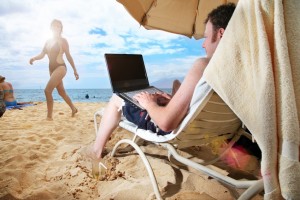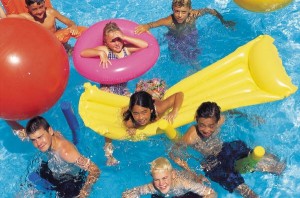Recently, we Tweeted (Follow us: @Debate_Central) a link to one of my very favorite blog posts about summer work. The author, a communications professor at Iowa, is writing for the benefit of graduate students, but he makes some excellent points that apply to debate. You can find the original article here.
I thought we’d do a post modifying this advice and adding some of our own favorites, but first:
Why do debate work in the summer?
Everyone loves summer. For most high school students, it’s a well-deserved break from the day-to-day grind of school and extra-curricular activities. After a long debate season, you’re likely tired and looking forward to picnics and lazy days at the pool. This isn’t to say you shouldn’t do that, but consider the following:
Do athletes take summers off training?
Quite simply, no. They may reduce their hours or intensity to recover when they don’t have a large upcoming event, but they absolutely don’t stop working hard to maintain their physical fitness and trying not to lose their gains. Summer debate work is important for these very same reasons:
1. You likely had your best debates at the end of the season. You knew your topic well, you had been debating consistently, and you didn’t have a summer’s worth of rustiness to contend with.
2. You likely had the worst debates of the season at the beginning. You hadn’t debated in a while, your knowledge base was lower, and you likely had to refresh your skill set.
3. Summer is an excellent time to build your base and work on things you had little to no time for during the season.
4. Even if you’re not working, your future opponents likely are. It may be a cliché, but hard work beats talent when talent doesn’t work hard.
Here are some tips for summer work that have been effective in the past:
1. Absolutely make a to-do list. It may seem like a no-brainer, but you might be surprised how many people skip this step or do it poorly. There are a variety of websites and apps to help you with this (see the link above), but pen and paper/a Word document work just fine.
2. Make a smart to-do list. A list with an item like “1. Write an affirmative” is not a very good list because writing an affirmative is a complex process with a lot of steps. It’s easy to procrastinate that list because you don’t know where to start working and feel too overwhelmed to begin. Break large tasks down into meaningful parts, like “1. Select a topic area of interest.” “2. Do some general searches to find a solvency advocate.” “3. Explore possible advantage areas.”
This approach is particularly great because each task will take slightly different amounts of time. Try to estimate them so you can figure out what you can reasonably accomplish in a day.
3. Block out time. All the to-do lists in the world are worthless if you never make time to do them. Make a debate appointment with yourself at a time you know you’ll keep it. Prefer to hang out at the pool during the day? Schedule some evening time to unwind and work a little. Prefer to catch some movies at night with friends? Get the work out of the way first thing in the morning. It doesn’t matter when you do it, simply THAT you do it, and only you know when you’re most likely to follow through.
4. Do it every day. Look, some days you may have 3 hours and some days you may have closer to 20 minutes. Try to do a little something every day anyway (remembering that you should have more 2-3 hour days than 20 minute days if you want this to work). Even if your time doesn’t feel productive (you don’t find any good websites, the evidence you find is more D- than A+), you’re doing good work. You’re making debate research a habit. You’re making yourself a better researcher (research is something that only improves with practice). You’re eliminating sources that aren’t very good from your “to-read” pile. Those are worthwhile even if they don’t seem like it at first.
5. Commit to how much time you’re going to spend that day in advance and don’t leave your workspace until you’ve spent it. If you decide to spend three hours on debate work, set a timer. During that time, stay in your workspace and don’t leave until the timer goes off. Even if you get distracted, just sit there and think your way through it. If you get discouraged, stay put. If your phone rings, don’t answer it. This capitalizes on the same reason most jobs require you to be in the office from 9-5, regardless of how much you have to do that day. That is, if you have to be in a set place for a set time and you can’t leave, you’re much more likely to use that time productively because there’s nothing else you could be doing. You lose the opportunity cost of, say, going to the pool or watching TV because your options are: be bored or do debate work. You’ll choose “do debate” every time.
6. Give yourself reasonable deadlines. Your to-do list is only as good as your benchmarks to do it. Everyone takes different amounts of time to do things and some tasks take more or less time than we expect. Keep yourself accountable by setting deadlines, and you’ll have a better idea how much time you need to spend every day. Is your affirmative not even close to done and due tomorrow? You need to spend as much time as it takes today. Do you have a family vacation next week but your first disadvantage is due that same day? You should try to be done before you leave.
7. Work on some stuff you don’t have time to do during the school year. Been reading a K? Read its source material, and not just to cut cards. Lose a lot of debates about global warming? Go through your backfiles, cut new cards, and catch up. Need to practice speaking? Speak every day. Practice in front of a mirror. Record yourself. Whatever debate work you always want to do but never get to do, do it now.
8. Do have some fun. Just as athletes may ratchet down their training to recover, you can do a little recovering in the summer. Read a book for fun, go to movies, hang out with your friends. You need to be motivated, but you also need to make sure you don’t burn out and that you stay well-rounded. Don’t just work, have fun. Just make sure the “fun” isn’t 24/7 of your summer.
Have questions about research and time management?



